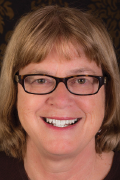The Public Manager Magazine Article
An Interview with Kitty Wooley
As a self-described convener, advisor, and catalyst and founder of Senior Fellows and Friends LLC, Kitty Wooley encourages federal employees to enhance the scope and impact of their work by building collaborative networks across organizational boundaries.
Thu Mar 10 2016

Although she retired in 2013 after a 19-year career with the U.S. Department of Education, Kitty Wooley has maintained an active professional life. As a self-described convener, advisor, and catalyst and founder of Senior Fellows and Friends LLC, she creates encourages federal employees to enhance the scope and impact of their work by building collaborative networks across organizational boundaries.
About Kitty Wooley
Kitty Wooley worked at the U.S. Department of Education for 19 years until her retirement in 2013. At the Department of Education, she used her skills in strategic network development, business analysis, knowledge transfer, and informal leadership development in her roles on the IT and Investment Management Team at the Office of the Assistant Secretary for Management, as part of the staff of the Deputy Assistant Secretary for Performance Improvement, and as a human capital strategist and management and program analyst. Today, she continues to help cultivate relationships and build talent as founder of Senior Fellows and Friends.
Tell us about your career with the Department of Education.
My first position involved moving from one side of the desk to the other—from college financial aid director to institutional review specialist at 50 U.N. Plaza in San Francisco. For the first two years, I was part of a great team that visited colleges in Region 9 to ensure that millions of dollars intended to help students pay for college were being administered capably. Subsequent positions in Washington, D.C., involved data and risk management, project management, business intelligence and decision support, stakeholder outreach, translation of IT issues into plain language, completing reports, staff work, and the design and execution of mentoring experiences for interagency budget staff. I retired early and relocated to Colorado Springs to become my 90-year-old mother's sidekick, caregiver, and executor.
What is one of the most important lessons you learned during your career in federal government?
I learned that it was necessary to take more personal responsibility. This was a steep learning curve that has continued into my current work. It took me a long time to understand how powerfully my behavior and attitude could affect the energy in the room, influence professional and institutional outcomes, and enable me to see new possibilities. Because government jobs are not ours to do with as we will, but are held in trust for the American people, this is a really big deal.
What inspired you to begin Senior Fellows and Friends?
The first event, a July 2003 dinner with a retired Air Force jet pilot turned HR executive who had been doing exciting strengths-focused work with IRS managers, occurred simply because I wanted to find out more. Rather than hog him to myself, I invited a dozen Excellence in Government senior fellows! We had a great time and learned a lot.
For months, I had been dismayed at how many EIG graduates had completed that expensive yearlong program only to return to their desks and wait for the next big thing. So when someone asked when I was planning to host another dinner, I looked at it as a way to create a return on the government's investment in me—and to learn continuously with an open-minded group.
The words and Friends in the name identifies us as a network that welcomes professionals whose email addresses do not end in .mil or .gov. I love that it spans generations and attracts people all along the career continuum.
What are your goals for the group?
For the foreseeable future, individual and organizational adaptability and resilience will be key themes. I'm convinced that it's important to span locations, level the playing field, and foil low expectations by finding untapped talent and capacity wherever it is, inviting it to play with a purpose and then re-engage back at the office. This will be done via video chats and in-person events, which now occur in D.C. and Colorado Springs and could expand elsewhere. Conversation that matters! We'll see where it goes.
